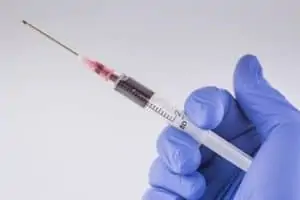Signing up for life insurance isn’t as simple as walking through the front door and putting a pen on paper. It can require additional steps, including blood-related tests, to determine whether or not a person is eligible.
Did You Try Out Our Life Insurance Quote Comparison Tool? Save BIG!
These details are mentioned in the contract and will be highlighted to the applicant as soon as he/she speaks to a representative. Life insurance is an essential investment and a great way to protect your loved ones, but it’s important to understand the nuances of blood tests in a process such as this.
Table of Content
Why Do Insurance Companies Require Blood Tests?
In general, this is done as a vetting process to determine whether or not the individual is a valid applicant. The life insurance policy hinges on these details, and having blood tests (and nicotine test) results in hand can make all the difference for both parties.
Remember, this can make or break how the agreement is penned and what the company agrees to. There is added risk if a person has been diagnosed with a condition and/or has lingering health-related issues to deal with. All of these are figured out by a qualified blood test as agreed upon in advance.
The blood test is designed to be a seamless process and doesn’t take a long time to complete. Insurance companies are able to dig through the results and come up with a conclusive picture of what is going on in the applicant’s body. This information is not kept by the company, nor is it passed on to anyone else. Both parties keep it, and will be shared as soon as the results come back. This is mentioned in the agreement to help move things along at a fair pace.
FREE Quotes, No Obligations!
What EXACTLY Do They Look For?
Each life insurance company is going to vary when it comes to the nature of their blood test. Some are going to run a generic blood test that looks for regular details, while others are more age-specific when it comes to the tests run.
The tests will check for:
- Cholesterol
- Blood Sugar
- Triglycerides
- Liver Enzymes
- HIV/AIDs
- Drug Use
- Tobacco Use
- Illnesses
Please note these are just some of the details a life insurance company will ask for in the blood test. If a person passes these details, he/she will be forwarded a robust agreement that is in line with the report.
Procedure
Let’s imagine you have taken the time to speak with a representative and want to get started on the process. What will it include?
In most cases, the application process will include pre-determined vetting based on general information (address, age, medical history), and then a blood test is going to be scheduled.
Compare life insurance quotes and save!
In some cases, they will also ask for a urine test to see what is going on in the body. All of this will be mentioned during the application process and will not be billed to the applicant. It is done at the company’s cost, and they will send a professional to complete the test. In some cases, a nurse will come to the applicant (home or work) and take the physical.
It is important to note that the nurse will not be drawing a large amount of blood and will only need a small amount to complete the task at hand.
Unsatisfactory Results
What if a person were to get an unsatisfactory result after an independent source had studied the blood test?
It is going to depend on what the report has to suggest and this will be mentioned in the follow-up. Sometimes, the numbers are going to be slightly off and could be remedied with a quick change in medication. This will be included in the discussion that is brought upon the subject.
A majority of “unsatisfactory” results may not disqualify the applicant. Instead, it might become useful information to take to your doctor and move forward with appropriate treatment. All it takes is a simple prescription for some of the issues to disappear.
However, if the condition is serious and it is going to have an impact on the company’s risk assessment, then it will be factored into the life insurance agreement. This might lead to an increase in costs.
Based on recent research, the most common finding from modern-day blood tests is high blood sugar, as it can have to do with one’s diet. It is best to understand this risk and take care of it as soon as possible. Being at risk for diabetes is a major issue and will be included in the agreement.
Life insurance companies are willing to work with their applicants and are going to offer a wide array of features. This can include working on increasing the deductible to offer a fairer deal. All of these details can be discussed after the blood test is returned. If you’re fear of needles, doctors, hospitals, and all that, don’t go for a guaranteed no-medical exam policy where you are not required for a blood test usually. But note that such coverage comes with a higher pricing plan.




